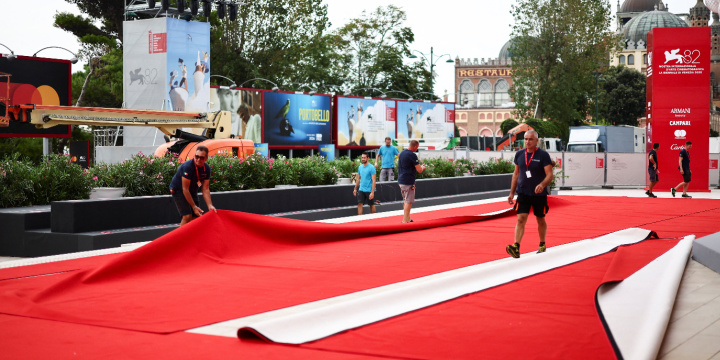Workers set up the red carpet a day before the start of the 82nd Venice Film Festival in Venice, Italy, Aug. 26, 2025. Photo: REUTERS/Yara Nardi
Hundreds of professionals in the Italian and international film industry signed an open letter on Saturday that calls on organizers of the 82nd Venice International Film Festival to take a “clear and unambiguous” stand and condemn what they describe as a genocide and ethnic cleansing taking place in the Gaza Strip.
Actor Toni Servillo – star of this year’s Venice opening film “La Grazia” – director siblings Alba and Alice Rohrwacher, director Marco Bellocchio, and filmmaker Matteo Garrone are among the Italians who have gathered under the banner V4P (Venice4Palestine) to publish the open letter. They call on the Venice Film Festival, its parent body the Biennale di Venezia, and the festival’s independent parallel sections Venice Days and the International Critics’ Week “to be more courageous and clear in condemning the ongoing genocide in Gaza and the ethnic cleansing across Palestine carried out by the Israeli government and army.”
“Stop the clocks, turn off the stars,” reads the first line of the open letter, which is written in Italian. “The burden is too much to carry on living as before. For almost two years now, we have been seeing images of unmistakable clarity from the Gaza Strip and the West Bank. Incredulous and powerless, we keep witnessing the torment of a genocide carried out live by the State of Israel in Palestine. No one will ever be able to say: ‘I couldn’t know, I couldn’t imagine, I couldn’t believe.’”
“It is time not only for empathy but also for responsibility,” they added. “Semantics, language, words, and images are not accessories, especially for those who believe in art: they are a form of fundamental and necessary resistance. Otherwise we should surrender to the evidence that being a filmmaker or journalist today no longer makes any sense.”
Members of the film industry outside of Italy who signed the letter include French Venice Golden Lion-winning director of “The Happening” Audrey Diwan, fellow French director Céline Sciamm, Iranian-French filmmaker Sepideh Farsi, and French-Swiss director-actor Laetitia Dosch.
Others who signed the open letter are British filmmaker Ken Loach, French actor Swann Arlaud, Bulgarian director Kostantin Bojanov, British actor Charles Dance, and Palestinian brothers Arab and Tarzan Nasser. The duo from Gaza together won Best Director in the Un Certain Regard section of the Cannes Film Festival this year for their film “Once Upon a Time in Gaza.”
Saturday’s letter also includes accusations that Israel has been persecuting Palestinians even before the Oct. 7, 2023, Hamas attack, and that it is time for members of the film industry to take a stand “to uphold the truth about ethnic cleansing, apartheid, illegal occupation of Palestinian territories, colonialism, and all the crimes against humanity committed by Israel for decades.”
“As the spotlight turns on the Venice Film Festival, we’re in danger of going through yet another major event that remains indifferent to this human, civil, and political tragedy. ‘The show must go on,’ we are told, as we’re urged to look away — as if the ‘film world’ had nothing to do with the ‘real world,’” the letter states. “The Biennale and the Venice International Film Festival should celebrate the power of art as a means of transformation, testimony, representation of humanity, and development of critical consciousness. And it is precisely this that makes art an extraordinary means for reflection, active participation and resistance.” The letter concludes with the proclamation “Free Palestine!”
The 82nd Venice Film Festival starts on Aug. 27, almost six weeks to the second anniversary of the deadly Hamas-led terror attacks in southern Israel on Oct. 7 2023, in which 1,200 people were murdered and 251 hostages were kidnapped to Gaza.
The Biennale released a statement in response to the open letter earlier this week, according to Variety. The cultural organization said it and the festival “have always been, throughout their history, places of open discussion and sensitivity to all the most pressing issues facing society and the world.”
“The evidence of this is, first and foremost, the works that are being presented [at the festival],” the Biennale noted, before giving as an example the film “The Voice of Hind Rajab” by Tunisian director Kaouther Ben Hania. The political drama, which is in competition this year at the festival, is about the killing of a five-year-old Palestinian girl, who was trapped in a car that had allegedly come under fire by Israeli forces in Gaza in 2024. The Biennale further noted in its statement that last year’s Venice Film Festival featured “Of Dogs and Men” by Israeli director Dani Rosenberg. The film is about a 16-year-old named Dar who returns to her kibbutz in Israel to look for the dog she lost during the Oct. 7 Hamas attack.
“The Biennale is, as always, open to dialogue,” the organization said in conclusion.
Click this link for the original source of this article.
Author: Shiryn Ghermezian
This content is courtesy of, and owned and copyrighted by, https://www.algemeiner.com and its author. This content is made available by use of the public RSS feed offered by the host site and is used for educational purposes only. If you are the author or represent the host site and would like this content removed now and in the future, please contact USSANews.com using the email address in the Contact page found in the website menu.





